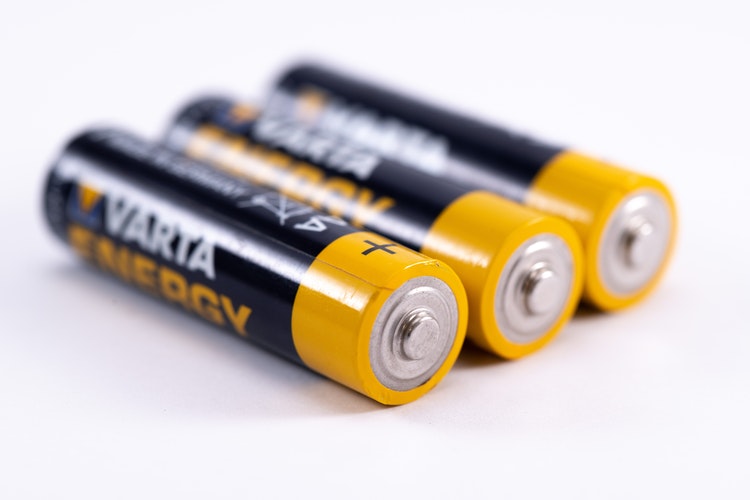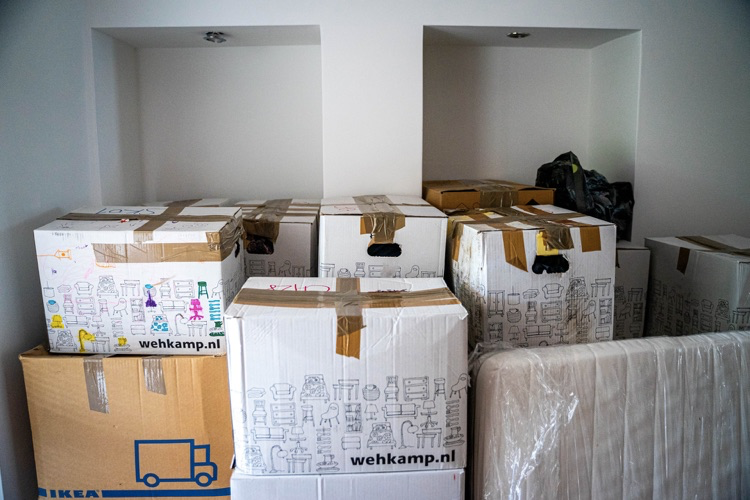How to store batteries
So many of our appliances rely on batteries, and we need to take them into account when packing things away in storage. Before you just throw all of your batteries into a box and store them away, think again. If not stored correctly, batteries can corrode, leak acid, lose their charge, and cause lasting damage to your other items in a storage unit.
When stored correctly, alkaline batteries can generally last up to around 10 years. And it’s easy to store batteries safely and correctly, as long as you take the right precautions. Here are some of the most important things to consider when placing batteries in storage.

Remove batteries from equipment
The first thing to do when you store batteries is to remove them from whatever they’re powering. Never put equipment into storage with batteries still in them. Doing this will help your batteries to last longer, and it will protect your devices.
There’s always the chance of battery leakage or corrosion, and you definitely don’t want this to happen inside your electronics. Batteries kept inside equipment can also run flat much quicker.
Store batteries at the correct temperature
Heat can damage batteries. If you’re storing batteries long-term, then it’s important to pay attention to the temperature of your storage unit. Having a climate controlled storage unit is the best option. This allows you to maintain a constant room temperature of around 15°C, which is ideal for batteries.
Contrary to popular belief, storing batteries in the fridge is not a good idea. The cold temperature will actually reduce the life of the battery, and the condensation could cause damage.
You also don’t want the batteries to be kept in fluctuating heat conditions. Maintaining a constant temperature is important for the life of your battery.
Store your batteries in the right containers
Like storing books, batteries need to be carefully contained when they are in storage. Never store your batteries in boxes with other items – especially not metal items. Properly contained batteries will prevent any electrical hazards, while maintaining the life of the battery.
The best option is to just use the batteries original containers, placed inside a plastic storage container. You could also use a battery storage box. If you do not have these, just use a regular plastic storage container, and try to separate the different batteries from each other.
Avoid loose batteries
Having a hunch of loose batteries rolling around in a box together is not a good idea. This could damage batteries and reduce their lifespan. A good solution is to bundle up batteries together with rubber bands. When doing this, make sure that you keep all positive and negative ends (the cathodes and anodes) at the same sides.
Store old and new batteries separately
Storing old and new batteries alongside each other can result in two problems. Firstly, the batteries could leak or get damaged. Secondly, you won’t know which batteries have full charge and which ones don’t when you’re looking for a new battery.
Always separate your old and new batteries to protect the batteries and make it easy to know which are charged. If you are not sure about this, you can always use a battery tester to make the job easy.

Store rechargeable batteries separately
Just like you separate old and new batteries, you should also separate your rechargeable batteries. To maintain your rechargeable batteries, it’s best to store them around 40% charge – not fully charged. Doing this lets the battery slowly lose its charge while being stored, which helps to protect the lifespan of the battery.
Keep batteries away from other valuables
Batteries can cause quite a lot of damage to other items. Sometimes batteries can leak acid, which will have a disastrous effect on anything they come into contact with. To make sure that your belongings are safe, always keep your batteries sealed up and away from any other valuables.
Store batteries in low humidity
High levels of humidity means there will be a strong chance of condensation damaging the batteries. The ideal humidity level for battery storage is around 50%. This is why storing batteries in the refrigerator or freezer is a bad idea, as the molecular structure of alkaline cells can change.
Avoid direct sunlight
Exposure to direct sunlight can quickly drain your batteries. Always store your batteries in cool, dark places – especially if they are being stored for the long term. A good solution is to store them in a dark plastic container instead of a clear one.
Conclusion
Like Amazon sellers, batteries are an important part of our daily lives, even though we often forget about them. They’re also expensive, so it’s important that we take care of them and for the longest life possible. This is why correct storage of batteries is so important.
The main consideration for battery storage is keeping an eye on environmental factors, like sunlight, temperature, and humidity. Keep the batteries safely packed in a container, organize them properly, and you will be able to safely store them away for many years.


